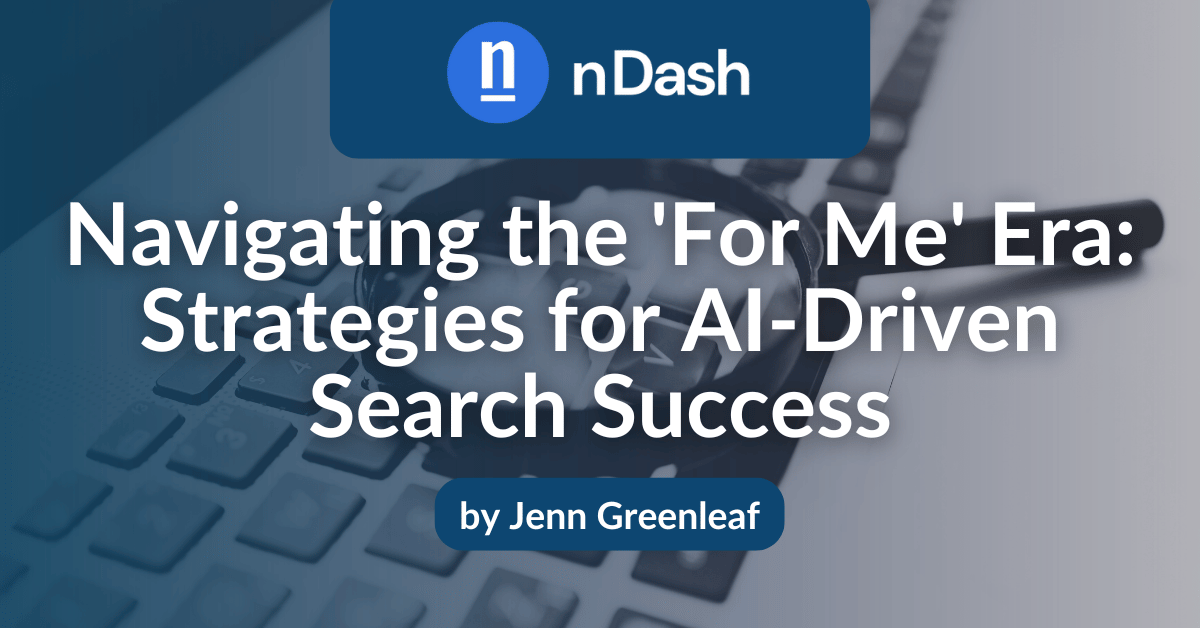Search is evolving from ‘near me’ to ‘for me,’ driven by AI and social media. Adapt to this shift for better engagement and relevance.
AI-Driven Search: From Desktop to Personalized Mobile Experiences
Search has undergone significant transformations, with mobile search and personalized experiences shaping how users find information. Over the past decade, search has dramatically evolved from desktop-centric methods to more personalized and mobile-focused approaches, driven by the rapid adoption of smartphones and advancements in AI technology.
The Mobile Search Era: Adapting to the Local and Immediate
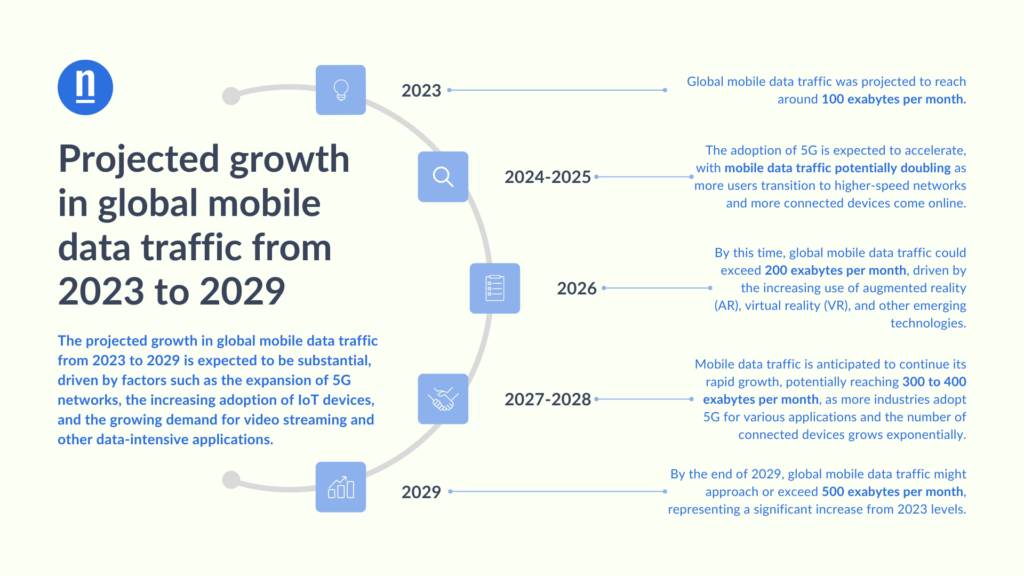
The rise of mobile search marked a significant transformation in how people access information. Google’s adaptation to prioritize ‘near me’ results was key, addressing the growing demand for local and immediate search queries.
As mobile search grew, Google continuously refined its algorithms to provide more relevant and localized results, transforming user experiences and expectations. This evolution paved the way for the rise of personalized search experiences, marking the beginning of the ‘for me’ era.
- Rapid growth: Mobile search is booming. By 2029, global mobile data traffic is expected to triple.
- Revenue trends: Despite a dip in revenue from the prior year, mobile operators brought in a solid total of 1.07 trillion U.S. dollars in 2022.
- 5G expansion: 5G’s share of mobile data traffic is expected to grow significantly, from 25% in 2023 to 76% by 2029.
- Projected growth: Average monthly mobile data usage per smartphone is projected to increase from 21 GB in 2023 to 56 GB by 2029.
How Google’s Algorithms Adapted to AI-Driven Search
With the surge in mobile search, Google faced the challenge of meeting users’ expectations for immediate and local results. This led to several significant algorithmic adaptations:
- Mobile-friendly updates: Google introduced updates to prioritize mobile-friendly websites in search results, ensuring users had a seamless experience regardless of their device.
- ‘Near me’ searches: Recognizing the growing demand for local information, Google enhanced its algorithms to prioritize ‘near me’ search queries. This included factors such as geographic location, user reviews, and business operating hours.
“A decade ago, the rapid growth of mobile search represented both an opportunity and a challenge for Google,” notes Jason Hartley. The challenge lay in meeting users’ expectations for immediate, local results, which Google addressed through algorithmic innovations and mobile-friendly updates.
Advancements in AI technology complemented the evolution of mobile search, further enhancing the user experience. AI tools began playing a crucial role in understanding user intent and delivering more personalized results. This integration of AI in mobile search not only improved search relevance but also changed approaches to content creation and marketing strategies.
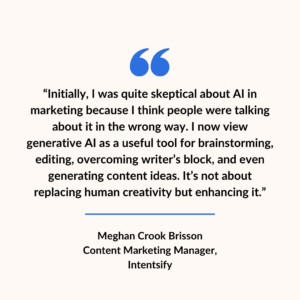
As AI continues advancing, its role in mobile search and marketing will become even more significant, offering new ways to engage users and meet their needs.
The Rise of Personalized Search: Entering the ‘For Me’ Era
As mobile search established itself, the next evolution was towards personalized search experiences, ushering in the ‘for me’ era. This new phase is characterized by the integration of generative AI and social discovery into search algorithms, fundamentally changing how users interact with search engines.
- By 2026, AI chatbots and virtual agents are expected to reduce search engine volume by 25%.
- Smartphone users are expected to consume an average of 21 GB of mobile data per month in 2023, increasing to 56 GB by 2029.
Transition to Personalized Search and the Role of AI-Driven Search
Personalized search tailors results to individual users based on their preferences, behavior, and context. A key driver of this change is AI, as it empowers search engines to interpret user queries with greater precision.
- AI-driven search personalization: AI algorithms analyze vast amounts of data to learn user preferences and deliver customized search results. This includes everything from past searches and location data to interaction patterns.
- Contextual understanding: Advanced AI models, such as natural language processing (NLP), help search engines understand the context and nuances of user queries, providing more relevant and accurate results.
“This signals the arrival of the ‘for me‘ era,” says Jason Hartley. “Amid this change, marketers – and the search engines themselves – must move beyond established tactics and focus on delivering deeply personalized experiences to be successful.”
Google’s E-E-A-T Criteria
To ensure high-quality, personalized search results, Google emphasizes the importance of E-E-A-T criteria: Expertise, Experience, Authoritativeness, and Trustworthiness. These principles guide content creators in producing valuable and reliable information that meets users’ needs.
- Expertise: Content should be created by knowledgeable and skilled individuals in the relevant field.
- Experience: Demonstrating firsthand experience and practical insights adds depth and authenticity to the content.
- Authoritativeness: Establishing the content’s credibility through recognized authority and reputable sources.
- Trustworthiness: Ensuring the content is honest, transparent, and accurate to build user trust.
By incorporating these principles, search engines can provide more personalized and trustworthy results, enhancing user satisfaction and engagement. High-quality content that demonstrates expertise and authority not only improves search rankings but also builds trust with the audience, which is crucial in the ‘for me’ era.
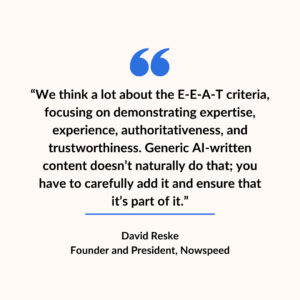
Integrating user interests gleaned from previous searches into search algorithms plays a key role in personalizing the experience. Social signals from platforms like Facebook, Twitter, and LinkedIn influence search results, making them more relevant to the user’s social context and interactions. This fusion of generative AI and social discovery creates a more interactive and engaging search experience, aligning with the changing expectations of modern users.
Key AI-Driven Search Changes
The integration of AI into search algorithms has led to several key changes that enhance personalization and user experience:
- Predictive search: AI predicts user queries based on previous behavior and trends, offering suggestions before the user finishes typing.
- Voice search: AI-powered voice assistants like Google Assistant and Alexa enable users to search using natural language, making searches more intuitive and accessible.
- Visual search: AI-driven search capabilities allow users to search using images, providing results based on visual content analysis.
- Real-time data processing: AI processes data in real-time to deliver up-to-date information, improving the relevance and timeliness of search results.
- User behavior analysis: AI tracks and analyzes user behavior to continuously refine and improve search algorithms, ensuring a more personalized experience over time.
💡 Action items:
- Evaluate your current search engine optimization (SEO) strategy and identify areas where you can incorporate more personalized elements.
- Optimize your website for mobile by ensuring it is mobile-friendly and loads quickly on smartphones.
- Focus on creating content that meets Google’s E-E-A-T criteria by showcasing your expertise, experience, authoritativeness, and trustworthiness.
Savvy Searchers: The Demand for Authenticity and Depth
Searchers today are more sophisticated, seeking authenticity and depth in their search results, driven by community-driven knowledge and advanced AI chatbots. As search continues changing, users expect more than basic information—they want insights, context, and personalized experiences.
Increasing Sophistication of Search Users
Today’s search users are more sophisticated than ever before. They demand not only accurate information but also authenticity and depth in the content they consume. This sophistication stems from their growing awareness of digital content and their ability to discern quality and relevance.
- Demand for authenticity: Users are increasingly skeptical of generic, low-quality content. They seek authentic, well-researched, and credible information that provides real value.
- Depth of information: Simple, surface-level answers are no longer sufficient. Users expect in-depth insights and comprehensive coverage of topics.
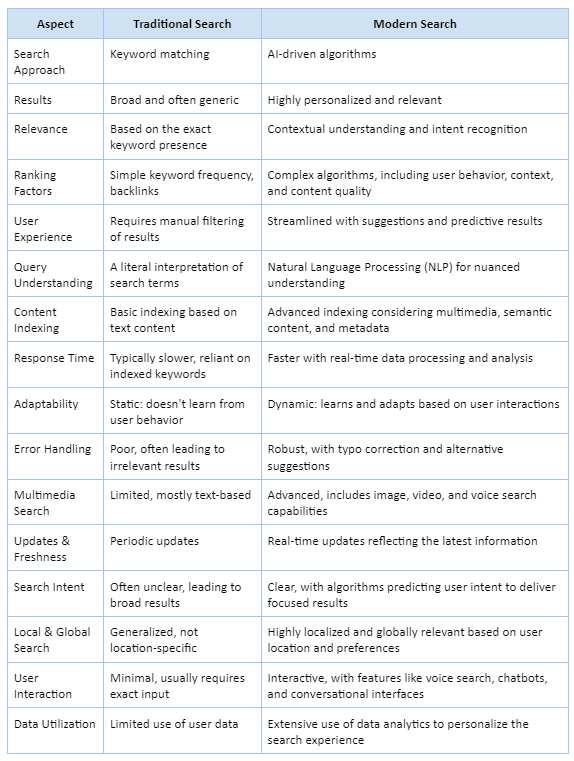
Traditional Search Limitations
Historically, search engines like Yahoo! and AltaVista relied heavily on basic text, images, and links to deliver results. These elements were sufficient for straightforward queries but often needed more depth and personalization, which users increasingly demanded.
Traditional Search:
- Relied on keyword matching and basic algorithms
- Results were often broad and not tailored to individual user needs.
- Limited in providing contextually rich and nuanced answers.
Modern Search:
- It uses advanced algorithms, AI, and machine learning to understand user intent.
- Results are highly personalized, taking into account user behavior, preferences, and context.
- Capable of delivering detailed, context-rich information and recommendations.
Google’s Integration of Community-Driven Knowledge
Google recognized this limitation and took significant steps to enhance its search results. One notable initiative was partnering with Reddit to integrate community-driven knowledge into search outcomes. This partnership aimed to provide richer, more nuanced answers by tapping into the collective wisdom of Reddit’s vast user base.
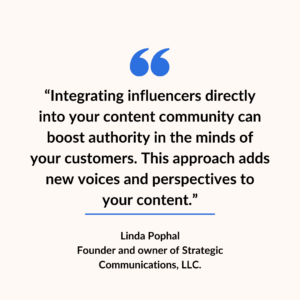
Expert insight further emphasizes this transformation. “Historically, search centered on basic text, images, and links, which were sufficient for simple queries,” explains Jason Hartley. However, this approach fell short in addressing more complex questions that benefit from user-generated insights.
- Community-driven content often outperforms traditional search results, providing more authentic and comprehensive answers.
- Influencers can significantly enhance the authority of your content, adding credibility and varied perspectives.
As David Ogilvy famously noted, “Good copy can’t be written with tongue in cheek, written just for a living. You’ve got to believe in the product.” This principle applies to search content as well—authentic, valuable information resonates more deeply with users.
The Influence of Community-Driven Knowledge: Reddit and Beyond
Community-driven knowledge has reshaped the way people access and trust information online. By fostering user-generated content, platforms like Reddit provide a space for authentic, peer-reviewed insights that traditional sources often lack. This shift highlights the growing preference for real, crowd-sourced advice and experiences over conventional search results.
The Impact of Reddit and Similar Platforms
The rise of community-driven knowledge has significantly impacted search behavior. Thousands of users now append “Reddit” to their Google searches, seeking authentic insights and community-driven knowledge.
- Community-driven insights often lead to higher engagement and trust among users compared to generic search results (Telecom Lead).
- Users increasingly rely on platforms like Reddit for authentic, peer-reviewed information, highlighting the shift towards valuing community knowledge.
This behavior highlights the value users place on genuine, crowd-sourced information. Integrating community-driven content into search algorithms not only enhances the depth of search results but also ensures the information is more relevant and trustworthy. These advancements are part of a broader shift towards valuing learning and education in the search process.
“Thousands of users now append ‘Reddit’ to their Google searches, seeking authentic insights and community-driven knowledge,” says Jason Hartley. This shift reflects a broader desire for learning and education in the search process.
As the demand for authentic content grows, search engines and content creators must adapt by incorporating more community-driven insights into their strategies. This approach ensures that the information provided isn’t only accurate but also resonates more deeply with users seeking real-world experiences and practical advice.

Integrating User-Generated Knowledge for Authentic Content
To leverage the power of community-driven knowledge, consider integrating insights from platforms like Reddit into your content strategy. Here are some actionable steps:
Monitor Relevant Subreddits:
Identify and monitor subreddits related to your industry or niche. Observe the discussions and note common questions, concerns, and trends.
Summarize and Integrate Discussions:
In your content, summarize valuable discussions and insights from Reddit threads. Provide a brief overview and link back to the original thread for more details.
Example: “In a popular Reddit thread on r/travel, users shared their best budget travel tips, including detailed itineraries and budgeting hacks. These insights offer practical advice beyond typical travel articles.”
Use Direct Quotes:
Incorporate direct quotes from knowledgeable Reddit users to add authenticity and authority to your content.
Example: “One Reddit user noted, ‘I always check out local farmer’s markets for fresh and affordable food when traveling. It’s a great way to save money and experience local culture.'”
Engage with the Community:
Participate in discussions within relevant subreddits. Answer questions, share your expertise, and build a presence in the community. This engagement can enhance your credibility and visibility.
Example: “By actively participating in r/SEO, it’s possible to stay updated on the latest SEO trends and gain insights from industry professionals and enthusiasts.”
Create Content Based on Community Trends:
Identify trending topics and frequently asked questions on community platforms and create content that addresses these areas. This approach ensures that your content is relevant and meets your audience’s current interests.
Generative AI Chatbots: Revolutionizing Search Interactions
The advent of generative AI chatbots has further advanced search. These tools leverage large language models (LLMs) to provide personalized, conversational search experiences. By using context from LLMs, AI chatbots can tailor responses dynamically, enhancing the relevance and accuracy of the information provided.
- Personalized interaction: AI chatbots use data from user interactions to tailor responses, making search more intuitive and relevant.
- Real-time assistance: These chatbots offer real-time answers and assistance, reducing the need for users to sift through multiple search results.
Think about Gartner’s prediction about a 25% drop in search engine volume by 2026 due to AI chatbots. OpenAI’s web search capabilities use context from LLMs to tailor responses as conversations unfold automatically.
“Generative AI chatbots, like OpenAI’s web search capabilities, take this crowd-sourced approach further by dynamically using context from LLMs to tailor responses automatically as conversations unfold,” notes Jason Hartley.
Capabilities of LLMs
AI chatbots are becoming increasingly personalized thanks to Large Language Models (LLMs) trained on vast amounts of text data. These LLMs enable them to understand and respond to natural language with greater nuance.
- Contextual understanding: LLMs can grasp the context and nuances of user queries, providing accurate and relevant responses.
- Content generation: They can generate coherent and contextually appropriate content, which can be used in various applications beyond search, including content creation and customer service.
- Dynamic responses: By analyzing previous interactions, LLMs can maintain the flow of a conversation, offering a more seamless user experience.
Predicting Future Trends and Impacts
As AI technology continues advancing, the role of generative AI chatbots in search is expected to grow even more significantly. Here are some future trends and impacts to anticipate:
- Enhanced personalization: AI chatbots will become even more adept at personalizing interactions, using deeper insights into user preferences and behaviors to offer highly tailored search experiences.
- Increased adoption: More businesses and platforms will adopt AI chatbots to improve customer engagement and support and reduce reliance on traditional search engines.
- Integration with other technologies: AI chatbots will integrate with different technologies, like AR and (VR, to provide immersive search experiences.
- Shifting search strategies: To enhance user experience with AI chatbots, marketers and content creators should craft engaging, conversational content that facilitates natural interactions.
This development represents a significant shift in how search engines interact with users. Katie Morton, Senior Managing Growth Editor at Search Engine Journal, adds, “AI will change how SEOs and content creators do their jobs.”
💡 Action items:
- Integrate community-driven content, such as user reviews and testimonials, into your website to build trust and authenticity.
- Identify areas where your content may be too basic or lacking depth and consider ways to enrich it with more detailed information and insights.
- Use social listening tools to track your brand’s mentions on community-driven platforms and incorporate insights into your content strategy.
The Impact of Social Searches: The Rise of Visual and Interactive Content
Social platforms are redefining search behavior, particularly among younger generations who prioritize visual and interactive content over traditional search results. This shift is transforming how brands engage with their audiences and how users discover products and services.
The Role of Social Platforms in Search
Social media platforms are increasingly becoming significant players in the search ecosystem. Unlike traditional search engines, social platforms like TikTok, Instagram, and Twitter offer unique search experiences that are more visual, interactive, and community-driven. These platforms allow users to discover content through hashtags, trends, and social interactions, making searches more engaging and personalized.
- Visual discovery: Platforms like Instagram and TikTok excel in visual search, where users find content through images and videos, offering a richer and more immersive experience.
- Community-driven search: Social platforms leverage user-generated content and community interactions, providing more authentic and relevant search results.
- Influencer contributions: Influencers play a key role in shaping social media search trends, as their content often appears prominently in search results and recommendations.
Gen Z’s Preference for Social Search
Platforms like TikTok and Instagram have emerged as powerful tools for product discovery, offering distinct advantages over traditional search engines. These social platforms excel at visual search, providing users with authentic reviews, immersive experiences, and insights into brand personality.
- Nearly 64% of Gen Z users prefer using social media to look up brands
- That’s compared to 51% of Gen Z women preferring TikTok over Google search
“Platforms like TikTok and Instagram excel at visual search and product discovery, offering authentic reviews, immersive experiences, and insights into brand personality,” says Jason Hartley. Katie Morton echoes this sentiment, stating, “Social search and alternative platforms will continue to rise in popularity.”
Gen Z’s reliance on social media for brand discovery is a testament to how much search is changing. This generation finds social media results more relevant and engaging than those from traditional search engines, which speaks to the importance of visually appealing and contextually rich content.
Shifting Consumer Expectations: The Need for Dynamic Engagement
Social search and AI chatbots are driving a shift in consumer expectations, requiring brands to adapt. Consumers now expect interactive, personalized experiences rather than static keywords and paid placements. This evolution necessitates a more dynamic approach to content creation and brand engagement.
Just over 30% of social media users prefer discovering new products through creators and influencers. This preference highlights the growing importance of influencer marketing in driving product discovery and engagement. Jason Hartley emphasizes, “Interactive experiences now supersede static keywords and paid placements.”
💡 Actionable Insights for Leveraging Social Search
- Optimize visual content: Create high-quality, visually appealing content that’s optimized for platforms like Instagram and TikTok. Use compelling images, videos, and infographics to capture users’ attention.
- Leverage influencer marketing: Boost your brand’s social presence by collaborating with influencers whose audience aligns with yours. Focus on building genuine partnerships to leverage their credibility and reach.
- Engage with trends and hashtags: Actively follow your industry’s latest trends and popular hashtags. Craft content that capitalizes on these trends to boost discoverability.
- Encourage user-generated content: Spark customer engagement by encouraging them to share experiences and tag your brand, fostering a strong brand community.
- Leverage social media analytics: Use analytics tools to track engagement metrics, understand user behavior, and refine your social search strategy based on data-driven insights.
The New Search Toolkit: Strategies for Thriving in the Age of AI-Driven Search
To thrive, brands must diversify their search presence, prepare for AI-driven search disruptions, and optimize their content and influencer strategies. Adapting to these changes will ensure sustained visibility and engagement.
Diversifying Search Presence
To thrive, brands must diversify their search presence and prepare for AI-driven search disruptions. Social media platforms like TikTok offer robust search functions while emerging chatbot technologies present new opportunities for brand engagement.
- Use multiple search engines: While Google dominates the search market, pay attention to other search engines like Bing, Yahoo, and DuckDuckGo. Each platform has a unique user base and algorithms, providing additional opportunities for visibility.
- Optimize for social media: Social platforms like Facebook, Instagram, Twitter, and LinkedIn have robust search functionalities that can drive significant traffic. Ensure your profiles are fully optimized with relevant keywords, engaging content, and up-to-date information.
- Embrace visual and video search: Platforms like YouTube, Pinterest, and Instagram offer visual search capabilities that cater to users seeking visual content. Create high-quality videos, infographics, and images to attract and engage this audience.
“Diversify your search presence: expand your visibility across social platforms that offer strong search functions, like TikTok, as well as emerging chatbot technologies,” advises Jason Hartley. This approach ensures that your brand remains accessible and relevant across multiple touchpoints.
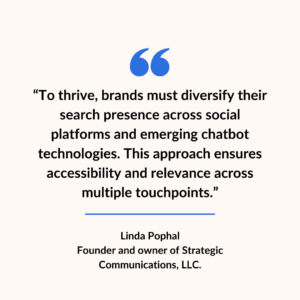
Additionally, a holistic content strategy that prioritizes quality and relevance significantly impacts search performance. By focusing on strong SEO fundamentals, brands can maintain visibility and drive user engagement.
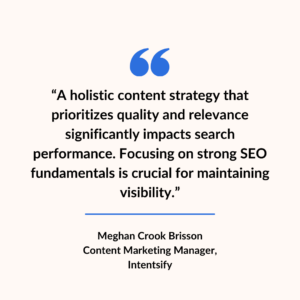
Preparing for Disruption
Understanding the evolution of paid search formats due to generative AI is crucial for maintaining an effective search strategy. AI’s impact on search advertising is profound, requiring brands to stay adaptable and informed.
AI’s Impact on Paid Search
AI-driven search tools are enhancing how ads are targeted, delivered, and optimized, leading to more effective and efficient marketing campaigns. Here’s how AI is impacting paid search:
- Advanced targeting: Ads are shown to users most likely to engage with them, increasing the return on investment (ROI) for advertisers.
- Automated bidding: AI-powered bidding strategies can automatically adjust bids to maximize ad campaign performance. By analyzing real-time data, these systems can bid more aggressively on high-value opportunities and conserve budget on less promising ones.
- Performance optimization: AI continuously monitors ad performance and makes adjustments to improve outcomes. This includes optimizing ad placements, adjusting targeting parameters, and tweaking creative elements based on what’s working best.
“Prepare for disruption: understand the likely evolution of paid search formats due to generative AI and emphasize adaptability in your search strategy,” says Jason Hartley. Kyle Byers, Director of Organic Search at Semrush, adds, “AI is incredibly powerful and flexible in what it can help marketers accomplish.”
This flexibility allows marketers to leverage AI for various tasks, from optimizing ad placements to creating more engaging and targeted advertisements.
Embracing Continuous Learning in AI
Stay informed about AI’s latest developments and its impact on paid search formats. By doing so, brands can adapt their strategies to fully take advantage of AI’s capabilities, ensuring their search advertising efforts remain effective and competitive.
- Follow industry leaders: Follow insights and updates from leading experts and organizations in AI and digital marketing. Subscribing to industry newsletters, following influential thought leaders on social media, and attending webinars can provide valuable information.
- Continuous learning: Invest in routine education and training to stay current with AI advancements. Many platforms offer courses and certifications in AI and digital marketing, which can help you deepen your understanding and skills.
- Experiment and test: Implement AI tools and technologies in your campaigns and continuously test new approaches. Monitoring the results of these experiments can offer practical insights into what works best for your specific context.
- Engage in communities: Participate in online forums, discussion groups, and professional communities where you can exchange ideas and experiences with peers. Platforms like LinkedIn, Reddit, and specialized industry groups can be excellent resources.
Optimizing Content Strategy
Creating engaging, accurate website content with strong SEO fundamentals is critical for maintaining visibility and driving user engagement. A holistic content strategy that prioritizes quality and relevance will significantly impact search performance. That includes for AI-driven search.
Key Areas to Focus On
- Value-driven content: Ensure your content provides real value to your audience. This could be in the form of actionable insights, in-depth analysis, or practical tips that address their needs and interests.
- Engaging formats: Use various content formats, such as blog posts, videos, infographics, and interactive elements, to cater to different preferences and keep your content dynamic and interesting.
- Storytelling: Transform your content by incorporating storytelling techniques to make it more relatable and unforgettable. Weave in personal stories, case studies, and real-world examples to illustrate specific points and captivate your audience.
- Visual appeal: Break through the noise with stunning images, videos, and graphics. Incorporate high-quality visuals that complement your content to spark emotions and create a lasting impression on your audience.
“Optimize holistic content strategy: prioritize engaging, accurate website content with strong SEO fundamentals,” advises Jason Hartley. By focusing on high-quality content and robust SEO practices, brands can improve their search rankings and user engagement, ensuring long-term success.
A well-rounded content strategy involves regularly updating and repurposing content to keep it fresh and relevant. Leveraging analytics to understand what content resonates with audiences can help refine and enhance content strategies, making them more effective.
Maintaining SEO Fundamentals
While creating engaging content is essential, maintaining strong SEO fundamentals ensures that your content is discoverable by your target audience. Here are some tips to help you optimize your content for search engines:
- Keyword research: Keyword research identifies what your audience searches for. Weave these keywords naturally into your titles, headers, and body text for improved SEO and organic reach.
- On-page SEO: To maximize organic traffic, optimize key on-page elements like meta titles (under 60 characters), meta descriptions (under 160 characters), and H1-H2 headers for readability and relevant keywords. Maintain clean URLs that are descriptive and keyword-rich.
- Quality backlinks: Build high-quality backlinks by reaching out to industry blogs and websites for guest posting opportunities. Craft informative content aligned with their audience to secure valuable backlinks and boost your SEO.
- Mobile optimization: Optimize your website for mobile to garner more traffic and climb search rankings. Search engines now favor mobile-friendly sites, so ensuring a smooth mobile experience is crucial.
- Page speed: Optimize your website for speed to improve user experience, reduce bounce rates, and potentially boost SEO. Compress images, leverage browser caching, and minimize code to speed up your site.
- Content freshness: Keep your content fresh and relevant to provide the best possible experience for your readers. Search engines also reward websites with up-to-date information, making it easier for people to find you.
For example, a tech blog might notice a significant drop in its organic traffic. After conducting an SEO audit, issues with keyword optimization and page speed were identified. By addressing these problems and updating its content strategy, it improved its search rankings and increased traffic by 30%.
Incorporating Influencer Marketing
Collaborating with influencers can amplify your brand’s reach and boost search rankings. Influencer marketing creates authentic, relatable content that resonates with audiences and enhances your brand’s visibility. Influencer content has the viral potential to boost search rankings and diversify content.
Strategies for Influencer Collaboration
Collaborating with influencers can significantly amplify your brand’s reach and credibility. Because influencers have established trust with their audiences, their endorsements can substantially boost engagement and conversions. Here are some effective strategies for collaborating with influencers:
- Identify the right influencers: Look for influencers whose audience aligns with your target demographic. Consider their engagement rates, authenticity, and relevance to your brand.
- Set clear objectives: Define the goals you aim to achieve through the collaboration. Whether it’s increasing brand awareness, driving traffic, or boosting sales, having clear goals will guide your strategy.
- Develop authentic relationships: Build genuine relationships with influencers. Engage with their content, understand their style, and communicate openly about your brand values and campaign objectives.
- Create engaging campaigns: Design campaigns that allow influencers to showcase your product or service creatively. Give them the freedom to create content that resonates with their audience while aligning with your brand’s message.
- Provide value: Offer influencers value beyond monetary compensation. This could include exclusive access to products, invitations to events, or opportunities for long-term partnerships.
“Incorporate influencer marketing: establish a purposeful strategy that collaborates with influencers to create and amplify searchable brand content, placing your brand in conversation and culture,” advises Jason Hartley. It’s an old quote, but Ann Handley’s advice still holds true today, “Make the customer the hero of your story.”
Benefits of Influencer Content
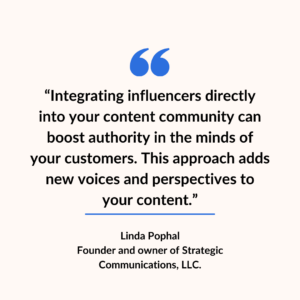
Influencer marketing offers numerous benefits that can enhance your brand’s visibility and reputation. Here are some key advantages:
- Increased reach: Influencers have dedicated followers who trust their recommendations. Partnering with them allows you to tap into a highly targeted audience that traditional marketing channels might struggle to reach.
- Enhanced credibility: Because influencers are seen as experts in their niches, their endorsements can significantly enhance the credibility of your brand, leading to increased trust and engagement with your products or services from their followers.
- Higher engagement rates: Content created by influencers often see higher engagement rates than brand-generated content. This is because influencers have a deep understanding of their audience’s preferences and know how to create compelling content.
- Improved SEO: Influencer collaborations can boost your SEO efforts. Influencers’ blogs and social media posts often link back to your site, increasing your backlink profile and improving your search engine rankings.
- Targeted marketing: Influencers’ followers are usually niche-specific, allowing you to reach a targeted audience that’s more likely to be interested in your offerings.
For example, say a skincare brand partnered with a popular beauty influencer to promote their new product line. The influencer created a series of video tutorials and Instagram posts showcasing the products. The campaign resulted in a 40% increase in website traffic and a 25% boost in sales within the first month.
Monitoring Developments
Staying updated on emerging paid ad models in AI services is crucial for maintaining a competitive edge. As AI technologies change, new opportunities for paid advertising will arise, requiring brands to stay informed and adaptable. Keeping abreast of these developments allows brands to strategically adjust their advertising efforts and leverage new tools for maximum impact.
Jason Hartley advises, “Monitor developments: pay attention to paid ad models that might emerge in subscription-based AI services.” This approach ensures that brands can capitalize on new opportunities as they arise.
In 2023, Google’s services contributed $739 billion to the U.S. economy, supporting millions of businesses and jobs. This highlights the significant impact of staying current with technological advancements.
Tips for Staying Informed
- Follow industry news: Regularly read industry publications, blogs, and news sites that focus on AI and digital marketing. Sources like Search Engine Journal, Marketing Land, and TechCrunch often feature the latest advancements in AI ad models.
- Subscribe to newsletters: Join mailing lists and subscribe to newsletters from leading AI and marketing technology companies. These often provide updates on new features, case studies, and best practices.
- Attend webinars and conferences: Participate in webinars, online workshops, and industry conferences. Events like the AI in Marketing Conference and Google Marketing Live are excellent opportunities to learn about cutting-edge AI ad technologies.
- Engage with professional communities: Join professional networks and online communities, such as LinkedIn groups, Reddit forums, and industry-specific Slack channels.
Encouraging Continuous Adaptation
As AI continues to change advertising approaches, it’s important to adapt your strategies to incorporate new developments continuously.
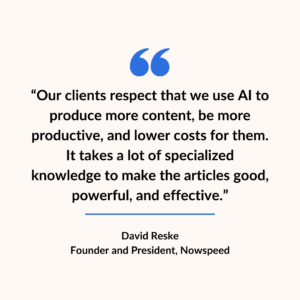
Here are some ways to ensure you’re always optimizing your approach:
- Implement AI tools: Regularly assess and integrate new AI tools into your advertising strategy. Tools that offer advanced targeting, automated bidding, and dynamic ad creation can enhance your campaign performance.
- Experiment and test: Don’t be afraid to experiment with new AI features and ad models. Conduct A/B tests to compare different approaches and identify what works best for your audience.
- Analyze performance data: Use analytics tools to monitor AI-driven ad performance. Regularly review CTR, conversion rates, and ROAS for data-driven optimization.
- Optimize based on insights: Continuously optimize your campaigns based on performance insights. Adjust targeting parameters, refine ad creatives, and tweak bidding strategies to improve results.
For example, say a retail company used AI-driven ad models to enhance its holiday marketing campaign. By implementing automated bidding and dynamic ad creation tools, they achieved a 25% increase in conversion rates and a 20% decrease in acquisition costs. Continuous monitoring and optimization were key to their success.
💡 Action items:
- Regularly update and optimize your website’s content to ensure it remains relevant and engaging.
- Identify influencers who align with your brand to create authentic content.
- Keep track of emerging paid ad models and AI tools.
Embracing the Future of AI-Driven Search
Adapting to shifts in search requires a multi-faceted engagement strategy. By diversifying search presence, preparing for AI-driven search disruptions, optimizing content, incorporating influencer marketing, and monitoring developments, brands can ensure they remain relevant and competitive. This strategic approach will help brands deliver personalized and engaging experiences to their audiences.
